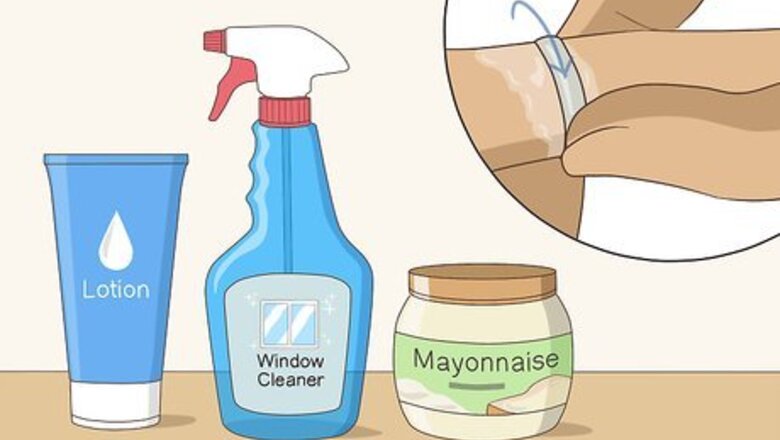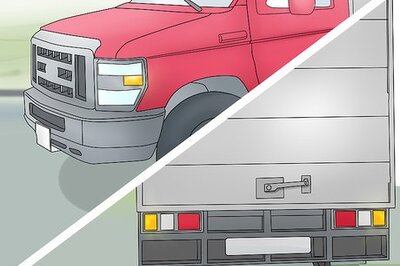
views
X
Research source
Luckily, some effective techniques may help you to get the ring off quickly. Start by using basic first aid techniques, such as elevating and icing your finger, before you try to remove it. If the ring is still stuck, try using string or elastic to compress your finger and make it easier to remove the ring. However, if these strategies don’t work or if your hand is injured, seek immediate medical attention.
Using Basic First Aid Techniques
Keep your hand under cold running water. Find a nearby sink and turn it to the coldest water you can handle. Hold your finger underneath the faucet to help bring down the swelling. The cold water will also help relieve some pain and make you feel less panicked.

Apply lubricant to the area of the finger around the ring. Dish soap, Baby Oil, and Hand Lotion are good options for lubricating your finger that are also safe on the skin. Windex may also work well as a lubricant for ring removal, but it contains chemicals that are not intended for skin use. Apply enough lubricant to coat your finger around the ring, but not so much that it’s dripping off your finger. Then, gently twist the ring to get the lubricant underneath it. Warning: If your skin is broken, it is best to seek medical attention. You can apply lubricant to the finger if it's critical to get the ring off, but the emergency department of your nearest hospital or call emergency services if the finger is injured.

Hold your hand above the level of your heart for 5-10 minutes. After lubricating your finger, lift your hand up above the level of your heart, such as by raising your arm above your head. Keep your fingers pointed straight up as you do this. Hold your hand in this position for as long as you’re able, but ideally around 5-10 minutes. Try sitting down at a table and resting your elbow on it if you’re unable to hold your arm above your head for very long.

Ice the finger for 5-10 minutes to reduce swelling further. Wrap an ice pack with a light cloth or paper towel and hold it against your finger. You can do this by holding the ice pack in your other hand and pressing it against your finger or by holding the ice pack with the affected hand. You can ice the finger at the same time as you are elevating it. If you don’t have an ice pack, wrap a paper towel around a bag filled with ice cubes or a bag of frozen peas or corn. Another option is to hold the finger under very cold running water for about 30 to 60 seconds.

Move the ring towards the lower knuckle while pressing upwards on it. After elevating and icing your finger for 5-10 minutes, the swelling may have gone down enough to get the ring off. Start moving the ring towards the end of your finger. As you do this, apply upward pressure to the ring from the underside of the finger. Pressing upwards on the ring may help to make it easier to get over the lower knuckle, which is the widest part of the finger. This technique is known as the caterpillar method.

Press up and swing the ring over the lower knuckle. Once the ring is up next to the knuckle, press upwards on the ring from the underside of the finger and swing the top part of the ring up and over the lower knuckle. This may feel uncomfortable, but the ring should come off if you can get it over the top part of the knuckle. If you are not able to get the ring over the top part of the knuckle, stop and try a different technique.

Push down on the ring and swing it under the lower knuckle. If you’ve managed to get the top part of the ring up and over the top of the knuckle, press downwards on the ring from the top. As you do this use your other hand to swing the bottom of the ring over the underside of the lower knuckle. Be careful not to push the ring back behind the knuckle as you do this. Don’t force the ring if it will not budge or you may hurt yourself. Try wrapping the finger next if the ring still won’t come off.
Wrapping the Finger with String or Elastic

Warning: Tight string wraps may damage a finger, and may increase finger swelling and make the problem worse if unsuccessful. However, this may work for simple stuck ring cases. If in doubt, avoid this method and seek medical attention. To try this method, get a spool of string, dental floss, or an 18 in (46 cm) elastic strap. It will take a lot of string or floss to cover your finger, so get a full spool to ensure that you will have enough. If you sue elastic get a piece that is at least 18 in (46 cm) long. Choose a piece of elastic that is about ⁄4 in (0.64 cm) wide, such as the strap from an oxygen mask.

Wrap the finger with string or elastic starting above the lower knuckle. Position the string or elastic’s edges close together as you wrap the finger in a spiraling fashion moving towards the ring. Keep going until you have covered the lower knuckle on the finger with string. Ensure that you wrap the finger tightly with the string so that it compresses the flesh. This will make it possible to remove the ring.

Insert the string or elastic under the ring with tweezers or forceps. When you reach the ring, use tweezers or forceps to insert the end of the elastic under the ring. Grasp the end and pull about 3 in (7.6 cm) of the string or elastic’s end through to the other side of the ring. Warning: This technique may feel uncomfortable because it will compress your finger. However, it usually only takes a few minutes to get the ring off and then you can remove the string or elastic.

Grasp the end of the string or elastic and start unwrapping it. Locate the end of the string or elastic that you threaded under the ring. Begin to unravel it moving in the opposite direction that you wrapped the finger. As you do this, the ring will gradually move out towards the end of the finger. The string or elastic will cause the ring to move in tiny increments towards the end of your finger, which is why this method often works better than trying to pull the ring off.

Keep going until you can slide the ring off of your finger easily. Once the ring reaches a point where it will slide off your finger, you can simply slip it off and then unravel the rest of the string or elastic. Circulation in the finger should return to normal within a few minutes after removing the ring. Make sure to take off all of the string or elastic even if this method does not work for you. The string or elastic can cut off your circulation even more if left on.
Seeking Medical Attention

Go to your nearest hospital if the ring is still stuck. If you cannot get the ring off, unwrap the string or elastic (if you tried this option) and seek immediate medical attention. If your finger is injured, it’s important to get the ring off as soon as possible before the swelling gets too bad. However, if you cannot get the ring off yourself, you may need to visit your local ER. Do not wait to seek emergency medical treatment for a ring that won’t come off. This can lead to more severe medical issues, such as infections and possibly even loss of the finger if the tissue dies.

Tell your healthcare providers about any symptoms you’re having. Make sure that you let the healthcare providers know if you’re experiencing any numbness, tingling, pain, or other unpleasant sensations in and around your finger. Also, make sure to point out any cuts or painful areas on your finger as this can complicate the removal process. Your healthcare provider may want to treat any damaged tissue on your finger first, such as by bandaging a cut.

Allow healthcare providers to cut off the ring if needed. In rare emergencies, your only option may be to let healthcare providers cut the ring off with a ring cutter. This may be necessary to stop the swelling and restore blood flow to your finger. While it can be upsetting to see a treasured piece of jewelry cut, keep in mind that the item can usually be repaired by a jeweler after it has been removed. There are FDA Registered Medical Device tools now available (the Ring Rescue Kit) that can safely cut all ring metals, including Titanium and Tungsten Carbide Rings. If this is not available, healthcare professionals may employ other non-medical-device techniques to cut a ring. In the special case of Tungsten rings, a controlled crushing technique using locking pliers may be successful for cracking a Tungsten Carbide ring, if other techniques do not work, and although this method risks creating sharp fragments, it can be successful with great caution. Warning: Do not attempt to cut off or crush a ring yourself. While it may be possible to crack a Tungsten ring, this is not the case for Titanium or other metals. Trying to crush a ring can result in severe injury, which could lead to more swelling and make it even hard to remove the ring.

Get any additional care for your hand or finger if needed. If your healthcare provider suspects that a bone in your finger or hand is broken as a result of injury, you may need to have imaging tests done after getting the ring removed, such as an X-ray or magnetic resonance imaging (MRI). Removing a ring can sometimes cause minor cuts or result in pain, which you may also need to have treated.

















Comments
0 comment